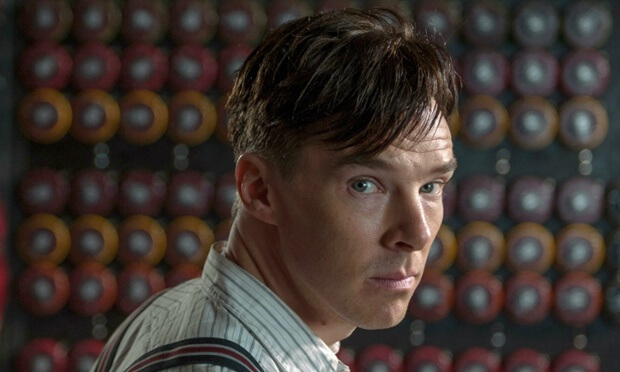Let’s get serious for a second, OK? When Benedict Cumberbatch signed on to play WWII code breaker and computer pioneer Alan Turing in “The Imitation Game,” he became pretty darn enamored with the man. And he thinks you should be, too. So here, in his own words, is why Cumberbatch thinks Turing is such “an extraordinary, extraordinary, extraordinary human being” — and why the film chronicling Turing’s decoding of the German Enigma machine and turning the tide of war deserves your attention. 1. He made great things out of great suffering: 2. He might’ve been good at solving things, but he’s not a Sherlock knock-off: 3. He never had a chance to be comfortable with himself: 4. He was not a fan of metaphors and puns: 5. He can be funny — and it’s OK to laugh: 6. SPOILER ALERT: It didn’t end well for him: Alan Turing in “the Imitation Game,” Julian Assange in “the Fifth Estate,” Sherlock Holmes on “Sherlock” — Benedict Cumberbatch has a way with playing socially awkward smart people. Just don’t call them autistic. “I think a lot of people are very lazy with that. It’s a really dangerous thing to toy with,” he tells Metro. “People talk about me doing that quite a lot and that being a good thing for people who are on the spectrum, which is great. But I don’t go into a job going, ‘Is this autism? Is this Asperger’s? Is this some other form of slight learning difficulty or disability?’ I’m very wary of that, because I’ve met people with those conditions. It’s a real struggle all the time. Then these people pop up in my work and they’re sort of brilliant, and they on some levels almost offer false hope for the people who are going through the reality of having an 18-year-old child who’s a child, who literally has the mental development of an infant.” So knock it off. Follow Ned Ehrbar on Twitter: @nedrick
“All of the worst moments in his life led to achievements. Being ostracized from a group made him think about isolating work. Not understanding how to communicate because so much of what he had to deal with in his life was to do with secrets made him an expert cryptographer. The idea of clandestine, repressed coding and analyzing that language was just completely borne out of his circumstance,” Cumberbatch explains.
“Though Sherlock is an immediate comparison, they’re so different. Sherlock is a sociopathic show-off, and Alan was anything but that,” Cumberbatch says. “He was a team player despite our narrative arc in our story.”
“At university, he was in a very openly extroverted and celebratory gay culture, but he was incredibly shy because he’d spent his entire childhood loving somebody who then died, and not having it consummated or having it reciprocated, he hadn’t formed that understanding of what that was and didn’t have any confidence with it. So that was almost as terrifying as complete intolerance.”
“There was just enough in language that he found disturbing to what he understood of things and how language should be used — what words are literally interpretable as rather than innuendo or inflection or irony,” he says. “If you take the bare instructions of what words are, he was fascinated with that.”
“It should be funny — and sometimes unintentionally on his part,” Cumberbatch says of the film. “It’s him missing the point, or not missing the point but everyone else using lazy language and him thinking they mean literally what they mean. I don’t think he was always trying to be a pedant. I think he genuinely did think in a very literal way, hence his discoveries.”
“I think it definitely was, without a doubt, suicide. He ended his life,” Cumberbatch says of Turing’s demise. Turing was convicted of “homosexual acts” in 1952 and punished with chemical castration. “The doctor got embarrassed about giving him [estrogen] injections so he put an implant in his hip, and it went on operating after the two-year sentence had finished. And he carved it out with a carving knife — he literally cut into his leg. This extraordinary mathematician and war hero cut into his own leg to try to stop it. And the desperation of that leads me to believe there was absolutely no way that it was anything other than suicide, conspiracy theories be damned.”
EXCLUSIVE Benedict Cumberbatch: 6 reasons Alan Turing is awesome

The Weinstein Company


















